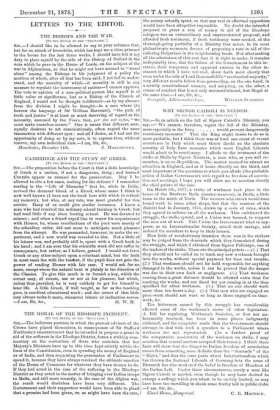WHY SIGNOR CAIROLI IS NEEDED. [To TILE EDITOR OF THE
" SPECTATOR:1
Sin,—In an article on the fall of Signor Cairoli's Ministry, you say,—" We cannot, therefore, regret the fall of the Ministry, more especially as the King would prevent dangerously reactionary measures." That the King might desire to do so is most probable, but I think there was at least one event of recent occurrence in Italy which must throw doubt on the absolute security of Italy from measures which most English Liberals would admit to be reactionary. I allude to the treatment of the strike at Biella by Signor Nicotera, a man who, as you will re- member, is an ex-Republican. The matter seemed to attract no attention in England, and as it bears directly on the third, and most important of the questions to which you allude (the probable action of Italian Governments with regard to freedom of associa- tion and meeting), I hope you will allow me to mention shortly the chief points of the case.
On March 5th, 1877, a strike of workmen took place in the house of the Brothers Reda (master-weavers), in Biella, a little town to the north of Turin. The weavers who struck would have found work in some other shops, but that the masters of the district had in January, 1876, drawn up a code of rules, which they agreed to enfoice on all the workmen. This embittered the struggle, the strike spread, and a Union was formed, to support the men out of work. This Union the Government tried to sup- press, as an Internationalist Society, seized their savings, and ordered the members to keep to their houses.
How little of revolutionary intention there was in the strikers may be judged from the demands which they formulated during the struggle, and which I obtained from Signor Policarpo, one of the leaders of the strike. These are the principal points :—(1 ) That they should not be called on to teach any new workman brought into the works, without special payment for time and trouble. (2.) That workmen should not be held responsible for anything damaged in the works, unless it can be proved that the danger was due to their own fault or negligence. (3.) That workmen coming from a great distance should be allowed extra time for reaching the works, and not fined for not coming in at the time specified for other workmen. (4.) That no one should work more than ten hours a day. (5.) That men who are engaged on piece-work should not work so long as those engaged on time- work, &c.
The bitterness caused by this struggle has considerably affected some of the workmen's views of other legislation. A Bill for regulating Workmen's Societies, at first not un- favourably received, has been in some places indignantly criticised, and the complaint made that the Government should attempt to deal with such a question in a Parliament where
workmen are not represented. (As a further proof of the comparative moderation of the workmen on strike, I may mention that several masters accepted their terms.) 1 think these facts will show that the danger to Italian freedom of association comes from something more definite than the " demands " of the "Right," and that the same panic about Internationalism which has thrown the National Liberals of Germany into the arms of Bismarck has also weakened the belief in freedom of Members of the Italian Left. Under these circumstances, surely a man like Signor Cairoli is needed, even though be may have desired to enlarge a suffrage which you admit to be unduly limited, or may have been too unwilling to check some frothy talk in public clubs. —I am, Sir, &e.,






































 Previous page
Previous page